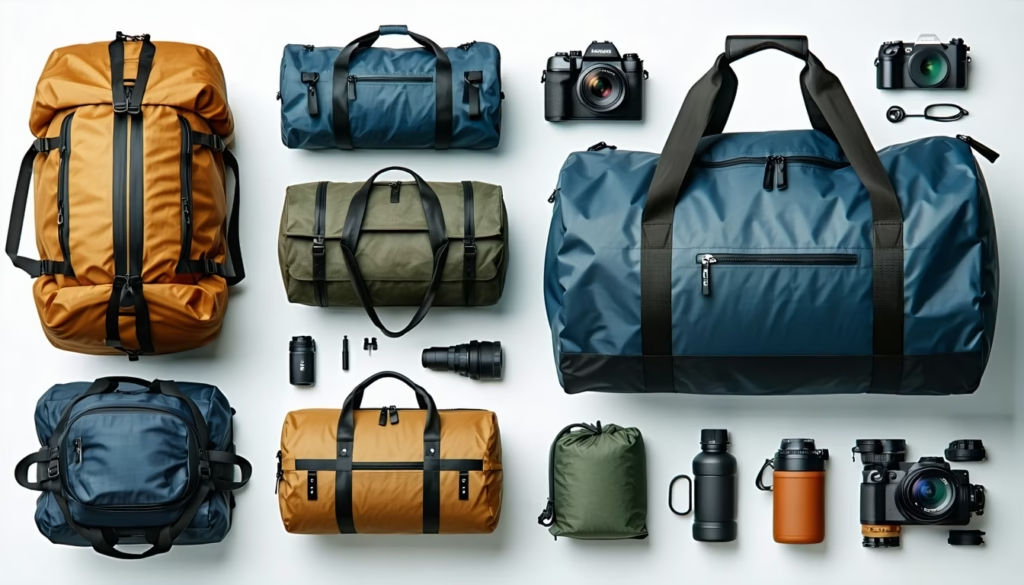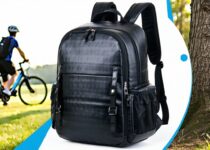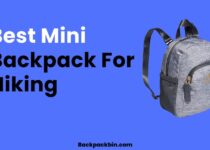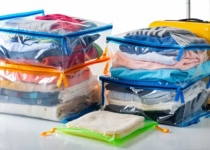Best Duffel Bags with Compression Straps For Extra Space

If you’re on the hunt for the best duffel bags with compression straps and ways to squeeze in extra gear, you’ve come to the right place. Duffel bags rule when you need big capacity for road trips, gym sessions, or checked luggage. But without a way to tighten things down, you can end up with a floppy, overstuffed mess. Compression straps lock your load in place, free up space, and keep everything neat.
In this review, you’ll discover top duffels that come with built-in straps or pack down into their own stuff sack so you can shrink them on demand. We’ll cover water-resistant options, lightweight packables, and rugged expedition-ready gear. By the end, you’ll know exactly which bag matches your packing style and gives you that extra breathing room.
Why Choose Compression-Strap Duffels
Compression straps are the difference between a bag that’s barely manageable and one that feels under control. They let you:
- Pull bulky sweaters, jackets, or towels tight
- Secure gear so it doesn’t shift during travel
- Slim down your duffel to fit overhead bins or tight car trunks
Sound good? Compression straps also help you keep things organized (no more digging through a loose pile) and protect fragile items by holding them snug against the bag’s sides. If you’ve ever peeked inside a duffel and found your socks tangled with electronics, you know why containment matters.
Plus, with a few packing hacks—like using compression bags to double suitcase space—you’ll max out every inch of volume without stressing the seams.
How We Picked These Duffels
We tested a wide range of bags for:
- Compression system – built-in straps, stuff-sack folding, or external loops
- Material durability – ripstop fabric, water-resistance, and hardware quality
- Carry options – backpack straps, shoulder straps, grab handles
- Capacity and packability – true liters vs real-world usable space
- Value and warranty – repair programs, lifetime coverage, price vs performance
Every duffel here earned its spot by delivering on one or more of those checkpoints. We also looked at user feedback to make sure these bags hold up on real-world adventures.
Patagonia Black Hole Duffel
Key Features
- 70-liter main compartment with internal compression straps
- 900-denier recycled ripstop laminated with TPU for water resistance
- Detachable shoulder strap, padded backpack straps
- Folds into its own stuff sack for easy storage
- External daisy-chain attachment points
Why It Rocks
Patagonia’s Black Hole Duffel is the gold standard if you want true built-in compression. Just cinch the interior straps, and bulky layers shrink down in seconds. The recycled ripstop feels nearly indestructible, and the TPU lamination keeps out unexpected rain or spills.
What Could Improve
The 70-liter model weighs a bit more than ultralight packables. If you’re pinching ounces, consider the 55-liter or 100-liter sizes instead (same tough construction, just more or less room).
Ideal For
Weekend trips, outdoor expeditions, and anyone who needs a tough duffel that can clamp down on bulky items without giving up weather protection.
Peak Design Travel Duffel
Key Features
- 35-liter capacity in a sleek, weatherproof shell
- Multiple carry modes: hand, shoulder, backpack
- Internal silicone-mesh pockets, shape-retaining nylon frame
- C0 DWR water-repellent treatment, lifetime warranty
Why It Rocks
If you expect to walk miles with your duffel, Peak Design nails comfort and organization. The frame keeps the bag from collapsing, even when half-empty, and the zippered pockets are perfect for stashing small essentials. Plus, you can pair it with a thin compression belt of your own to tame bulk.
What Could Improve
At 35 liters, it’s not a blow-out size. But if you’re a minimalist who still wants a bit of structure, this hits the sweet spot. For extra room, check out the 45-liter version.
Ideal For
City breaks, commuter travel, and anyone who loves a bag that stands tall and keeps gear sorted (pair with packing cubes for ultimate luggage organization to level up).
Matador Packable Duffels
ReFraction vs Freefly
- Both 30-liter capacity
- Pack into their own pocket (acts like a built-in stuff sack)
- YKK sealing zippers, waterproof coating
- Freefly is the tougher, more weatherproof option
Key Features
- Ultralight recycled fabrics that hold shape when partially packed
- Three-year warranty on both models
- D-rings for clip-on straps or carabiners
Why They Rock
You get a spacious duffel that disappears into your bag when you’re done. The Freefly’s weatherproof coating stands up to light rain, while the ReFraction keeps your kit organized without adding much weight.
What Could Improve
They’re not as durable as a 900-denier ripstop duffel. Treat them like your emergency backup rather than daily beaters.
Ideal For
Spontaneous getaways, gym trips, or as a backup bag for souvenirs.
WaterField Packable Duffel
Key Features
- 24-liter capacity, folds into its own pocket
- Taslan nylon with water-resistant coating
- Self-sealing waterproof zippers
- Luggage-handle slot for trolley attachment
Why It Rocks
This bag’s structured design feels premium compared to most packables. When you tuck it away, the pocket is slim enough to stow in a coat pocket. When you pull it out, it goes from tiny to ready-to-load in a flash.
What Could Improve
It doesn’t pack down as small as some ultralights. But the trade-off is a sturdier feel and better weather protection.
Ideal For
Air travel, day hikes, and anyone who wants a packable bag that still looks sharp.
Yeti Panga Waterproof Duffel
Key Features
- 50-liter capacity, proven watertight design
- Waterproof nylon shell, zipper, and welded seams
- Multiple lash points for strapping gear externally
- Adjustable, padded shoulder straps
Why It Rocks
When you need to keep electronics, documents, or camping gear bone-dry—even if you dunk the bag—Yeti’s Panga delivers. The shell is nearly indestructible, and the lash points give you plenty of options to attach extra kit.
What Could Improve
At full size, it’s on the heavier side. If you’re not crossing rivers or facing torrential downpours, a lighter duffel might suit you better.
Ideal For
Boating trips, river crossings, and anyone who refuses to risk damp gear.
Osprey Transporter Duffel
Key Features
- 65-liter main compartment
- Padded backpack harness with sternum strap
- Four tough grab handles for easy loading
- High-quality materials and construction
Why It Rocks
Osprey borrowed its best backpack tech for this duffel. Carrying heavy gear becomes downright comfortable, whether you’re hauling into a mountain hut or dragging luggage through an airport.
What Could Improve
No built-in compression straps. You’ll want to add an external strap or pack your heaviest items in compression cubes to keep things tight.
Ideal For
Hikers, photographers, and anyone lugging heavy gear long distances (also see space-saving hacks for camping backpacks and gear).
Compare Compression Features
| Duffel Bag | Capacity | Internal Straps | Packable | Weatherproof |
|---|---|---|---|---|
| Patagonia Black Hole Duffel | 70 L | Yes | No | Water-resistant |
| Peak Design Travel Duffel | 35 L | No | No | Water-repellent |
| Matador ReFraction / Freefly | 30 L | No | Yes | Light shower-proof |
| WaterField Packable Duffel | 24 L | No | Yes | Water-resistant |
| Yeti Panga Waterproof Duffel | 50 L | No | No | Fully waterproof |
| Osprey Transporter Duffel | 65 L | No | No | Water-resistant |
Add Compression Strap Hacks
Don’t have built-in straps? No problem, you can still compress any duffel:
- Use adjustable cam-strap belts to wrap the bag
- Pack bulky items into compression cubes (try layering per our step-by-step guide to layering clothes efficiently when packing)
- Tuck rolled clothes into side pockets to even out bulk
- Clip external daisy-chain loops with carabiners and webbing straps
With a little creativity, you’ll mimic that cinched-down feel no matter which bag you carry.
Frequently Asked Questions
What are compression straps on a duffel bag?
Compression straps are adjustable webbing straps that run across or inside the main compartment. They let you cinch down the volume so your gear stays in place and you free up space.
How do I use compression straps effectively?
Loosely load your items, tighten the straps until the bulge is gone, then re-adjust your gear as needed. Pair straps with packing cubes to group items and compress them even further.
Are internal or external straps better?
Internal straps keep everything inside neat, while external straps work on almost any bag. If you switch duffels often, external adjustable belts give you more flexibility.
Can I add compression straps to any duffel?
Yes. A couple of cam-straps or a small luggage belt easily clip or loop around any bag. Just make sure the buckles and webbing are strong enough for your gear.
How many liters of capacity do I need?
For weekend trips, 30–50 liters is usually enough. If you carry bulky items—like boots or subzero sleeping bags—aim for 60 liters or more so you can still cinch things down.
What’s the difference between packable and strap-equipped duffels?
Packable duffels fold into their own pocket, making storage a breeze. Strap-equipped bags start large but shrink down once you fasten the straps.
Are water-resistant duffels worth it?
If you travel in wet climates or handle equipment near water, yes. Even a light shower can soak through non-treated fabric and ruin clothing or electronics.
Conclusion and Recommendation
Compression straps turn any duffel bag into a space-saving powerhouse. If you want an all-in-one solution with built-in straps, the Patagonia Black Hole Duffel is hard to beat for its durability and reliable compression system. For ultralight or packable options, Matador and WaterField give you compact storage when you pack light, then expand when you need it.
Pick the bag that matches your trip style—whether that’s a weekend getaway, a long haul in the wilderness, or a wet-and-wild adventure. Then tighten those straps, and enjoy the extra breathing room in your luggage. Which duffel will you grab first? Let us know in the comments below.


